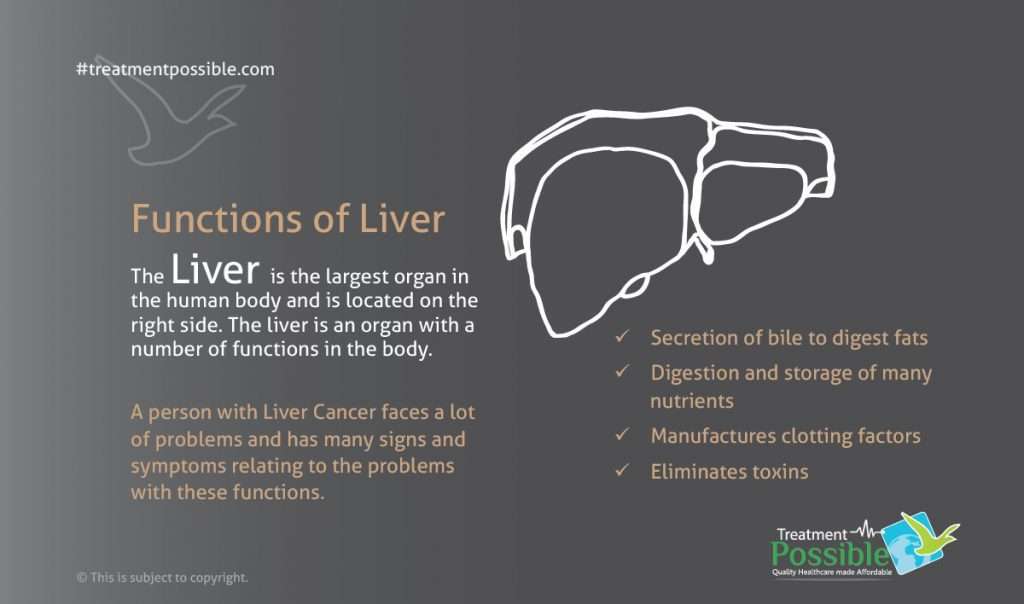Verified By: Dr. Rakesh Rai (American Society of Transplant Fellowship, MD, FRCS, CCST) |Updated On March 12, 2021
Navigate To:
What is Liver Cancer?
Liver cancer is the growth and spread of abnormal cells in the liver. Your liver is your largest internal organ and is found just above your abdomen, below the right ribs. Your liver has a vital role in your survival. You can survive without some other organs, such as one kidney, one lung, or your gallbladder, but you cannot live without your liver. The liver is essential for digesting food and removing all the toxic substances from your body. The functions of the Liver are as follows:
- removing toxins from your blood
- converting nutrients from the foods you eat
- storing minerals and vitamins
- regulating blood clotting
- producing cholesterol, proteins, enzymes, and bile
- making factors that fight infection
- removing bacteria from your blood
- processing substances that could harm your body
- maintaining hormone balance
- regulating blood sugar levels

When cancer develops in the liver, it destroys liver cells and it loses the ability to perform the above functions. There are several types of cancer but the most common type of liver cancer is hepatocellular carcinoma. This begins in the main type of liver cell (hepatocyte). The other types of liver cancer would be fibrolamellar HCC, cholangiocarcinoma (affecting the bile duct) and angiosarcoma, also called hemangiosarcoma. Liver cancer is classified as primary and secondary. Primary liver cancer develops in the cells of the liver. Secondary liver cancer develops when cancer cells from other organ spreads to the liver.
-
1. Chronic hepatitis is the cause of 80 percent of liver cancer cases in the world. Type-C hepatitis can lead to cirrhosis or liver cancer.
2. Phthalates (softeners of hard plastics) are used widely in polyvinyl chloride plastics which are found in teething rings and other toys can cause liver and kidney cancer, and shrink testicles.
3. Vinyl Chloride Propellant in certain Hair Sprays is also linked with a rare form of liver cancer.
4. Anabolic steroid which is used by athletes can increase the risk of liver cancer, sterility, kidney damage, and heart trouble, just to name a few.
5. Alcohol increases the risk of cancer of the mouth, the pharynx, the larynx, esophagus and Liver.
Request a Free Estimate

- Travel to India for Affordable and Advanced Healthcare
How does Liver Cancer develop?
DNA cells contain instructions for every chemical process in your body, but Liver cancer starts when liver cells develop changes (mutations) in your DNA. The result is that cells may begin to grow out of control and eventually form a tumor.
What are the Liver Cancer Symptoms?
Most people do not experience symptoms in the early stages of primary liver cancer, but symptoms are more likely to occur with later stages of liver cancer, they include:
- Unintentional weight loss
- Loss of appetite
- a feeling of fullness even after small meals
- abdominal pain or stomach pain
- Nausea and vomiting
- fatigue
- swollen abdomen
- Jaundice (yellowing of the skin and the whites of the eyes)
- White, chalky stools
What are the Causes and Risk factors of Liver Cancer?
Primary liver cancer (hepatocellular carcinoma) occurs in the liver, the causes and risk factor of liver cancer will include:
- birth defects
- alcohol abuse
- a chronic infection caused by diseases such as hepatitis B and C,
- hemochromatosis
- cirrhosis
- Diabetes and obesity are also risk factors. People with diabetes tend to be overweight or obese which causes liver problems and increases the risk for liver cancer.
- Aflatoxin is a carcinogenic (cancer-causing chemical) which is produced by a mould that can appear on foods like peanuts, corn and cassava.
If you have a first-degree relative (parent or sibling) who has liver cancer, the risk of getting it is higher, compared to someone who does not have close relatives with liver cancer. An ultrasound of the liver and blood tests every six months is a common recommendation.
How is Liver Cancer Diagnosed?
A diagnosis of liver cancer begins with a comprehensive physical exam during which you describe your symptoms and medical history. Other diagnostic procedures include:
-
Blood test – Liver function tests can help your doctor determine the health of your liver by measuring levels of proteins, liver enzymes, and bilirubin in your blood.
-
Alpha-Fetoprotein (AFP) Testing – The presence of alpha-fetoprotein (AFP) in the blood can be a sign of liver cancer. This protein is usually only produced in the liver and yolk sac of babies before they’re born. AFP production normally stops after birth.
-
Imaging Tests – Abdominal CT or MRI scans produce detailed images of the liver and other organs in the abdomen. They allow your doctor to pinpoint where a tumor is developing, determine its size, and assess whether it has spread to other organs.
-
Liver Biopsy – During a liver biopsy, your doctor will insert a thin needle through your skin and into your liver to obtain a tissue sample. In the lab, doctors will examine the tissue under a microscope to check for cancer cells. Liver biopsy has a risk of bleeding, bruising and infection.
Once liver cancer is diagnosed, your doctor will determine the extent (stage) of cancer.
Want more clarification about medical expense & treatment plan?
Plan Your Liver cancer Treatment In India
Get a Free Doctor's OpinionWhatapp UsWhat are the Liver Cancer Stages?
Staging tests will help to determine the size and location of cancer and whether it has spread. Staging can help your doctor determine your treatment options and your outlook. To help in the treatment options, healthcare professionals divide it into four stages:
-
Stage 1: The tumor remains in the liver and has not spread to any other organ or location.
-
Stage 2: Many small tumors are remaining in the liver or a tumor that has reached a blood vessel.
-
Stage 3: There are various large tumors or one tumor that has reached the large blood vessel.
-
Stage 4: Cancer has metastasized which means it has spread to other parts of the body.
Once a doctor has diagnosed and the stage of cancer is identified then a person can start the treatment.


